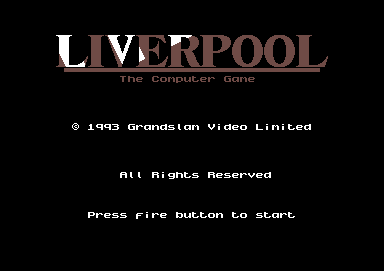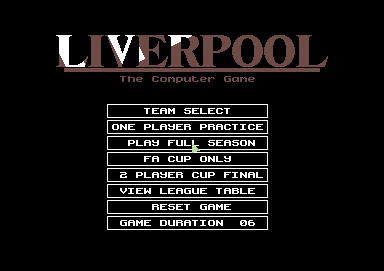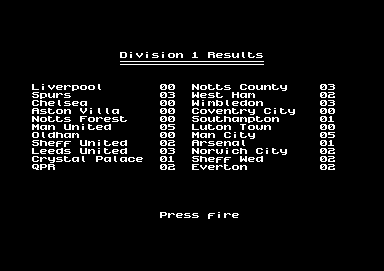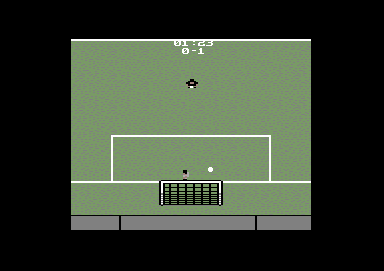Retro Replay Review
Gameplay
Liverpool: The Computer Game on the Commodore 64 brings the beloved top-down football action into your living room with surprising fidelity. Arc Developments retain the core mechanics pioneered in 16-bit kicks like Kick Off, delivering an intuitive one-touch passing system that feels responsive under the joystick. Controlling your players feels tight; you can weave through defenses with close ball control and quick direction changes, rewarding both strategic buildup and opportunistic counterattacks.
The match options mirror those of its 16-bit counterpart, offering cup tournaments and full season campaigns with variable match lengths. While you won’t find lengthy, marathon fixtures here, the ability to choose shorter matches caters perfectly to on-the-fly play sessions. For die-hard fans seeking statistical immersion, the player profiles dashboard provides basic yet functional stats—goals scored, appearances, and disciplinary records—though it lacks the narrative flair or scouting advice some might expect.
One area where the C64 conversion diverges slightly is set-piece execution. Free kicks in Liverpool: The Computer Game can feel a bit imprecise, requiring a steadier hand and a good deal of trial and error to send the ball curling into the top corner. While this adds to the challenge, it may frustrate those looking for pinpoint accuracy. Still, the balanced pace and realistic ball physics ensure that every goal—whether a thunderous drive or a scrappy scramble—is earned.
Multiplayer remains a strong selling point, allowing head-to-head clashes that capture the competitive spirit of Saturday afternoon matches. Whether you’re reliving classic Liverpool rivalries or staging friendly fixtures with pals, the game’s pick-up-and-play design makes jumping into the action seamless. Overall, the gameplay strikes a fine balance between accessibility for newcomers and depth for seasoned retro footy fans.
Graphics
Visually, Liverpool: The Computer Game embraces the Commodore 64’s palette with charmingly blocky sprites and distinctly vibrant pitch turf. The top-down vantage point provides a clear view of the entire field, enabling smart position play and quick tactical adjustments. While the resolution is modest by today’s standards, each player is easily identifiable by shirt color and number, keeping on-screen clutter to a minimum.
Animations are surprisingly smooth for a C64 title. Players sprint, slide tackle, and backpedal with recognizably human motion, and ball physics—though simplified—respond believably off bodies and posts. The minor pop-up of spectators around the edge of the pitch adds atmosphere, suggesting packed stands even if the detail is rudimentary. Goal celebrations, though brief, inject a sense of reward as your team erupts into pixelated cheers.
Menu screens and player profile pages follow a clear layout with bold fonts, ensuring that lineup changes and tactical tweaks remain straightforward. While there’s no lavish artwork or cutscene sequence, the game makes up for it in consistent visual clarity. The color contrasts—bright green grass versus dark player kits—help maintain legibility during intense scrambles in midfield or penalty-box scrambles.
On the downside, weather effects are minimal; there’s no rain overlay or shifting pitch conditions to simulate a drizzly Anfield day. Nonetheless, the core graphical presentation accomplishes its goal: it delivers a functional, aesthetically cohesive football experience that keeps the focus squarely on the match itself.
Story
As a sports simulation, Liverpool: The Computer Game doesn’t weave a narrative in the traditional sense, but it captures the essence of leading one of England’s most storied clubs. From the moment you select the iconic red kit, the game summons the weight of Liverpool’s history—15 league titles, European triumphs, and legendary players. This backdrop lends every fixture a sense of significance, immersing you in the responsibility of maintaining the club’s storied legacy.
Between matches, the stripped-down management interface functions as the game’s “story engine.” Adjusting formations, swapping players in and out, and setting match lengths all contribute to a meta-narrative of a manager steering the club through domestic cups and league campaigns. There are no cutscenes or manager monologues, but the evolving league table and the progression through knock-out rounds craft a personal tale of triumphs and heartbreaks.
Your season unfolds match by match, with each win building momentum and each defeat fueling determination to recover. This episodic structure replaces a scripted storyline, encouraging you to set personal goals—going unbeaten in November, improving your goal difference, or building a squad around key stars. While it’s a far cry from a story-driven RPG, the emergent drama of cup finals and last-minute winners delivers its own brand of narrative satisfaction.
Ultimately, the “story” of this game resides in the ebb and flow of your campaign. For fans of football history and club management challenges, the absence of an explicit plot frees you to write your own legend on the pitch.
Overall Experience
Liverpool: The Computer Game for the Commodore 64 offers a compelling retro football simulation that balances authentic gameplay with streamlined presentation. Arc Developments’ decision to echo the beloved Kick Off mechanics ensures that passing and ball control feel familiar yet engaging. Options for cup and full season play—alongside variable match lengths—grant you flexibility to tailor every session, whether you have five minutes or five hours to spare.
While the graphics show their age, they never impede the game’s core: fast-paced, tactically rewarding football action. The straightforward menu system and clear on-field visuals mean you’re never lost in layers of submenus or unsure where to pass next. Even free-kick frustrations add character, as mastering the quirks of the C64 conversion becomes part of the long-term appeal.
The lack of a conventional storyline won’t deter football purists; if anything, it spotlights the emergent drama of each fixture. Your managerial journey—filled with ups and downs, surprise victories, and tactical conundrums—becomes the narrative thread guiding you through every season. The game’s multiplayer mode further amplifies replay value, inviting you to settle local rivalries in head-to-head showdowns.
For collectors and retro enthusiasts, Liverpool: The Computer Game stands as a noteworthy entry in the C64 library. It may not boast modern bells and whistles, but its enduring charm lies in the pure joy of controlling the proverbial round thing with pixel-perfect precision. If you’ve longed for a bite-sized yet challenging football experience on the Commodore 64, this conversion is well worth lacing up your boots for.
 Retro Replay Retro Replay gaming reviews, news, emulation, geek stuff and more!
Retro Replay Retro Replay gaming reviews, news, emulation, geek stuff and more!








Reviews
There are no reviews yet.